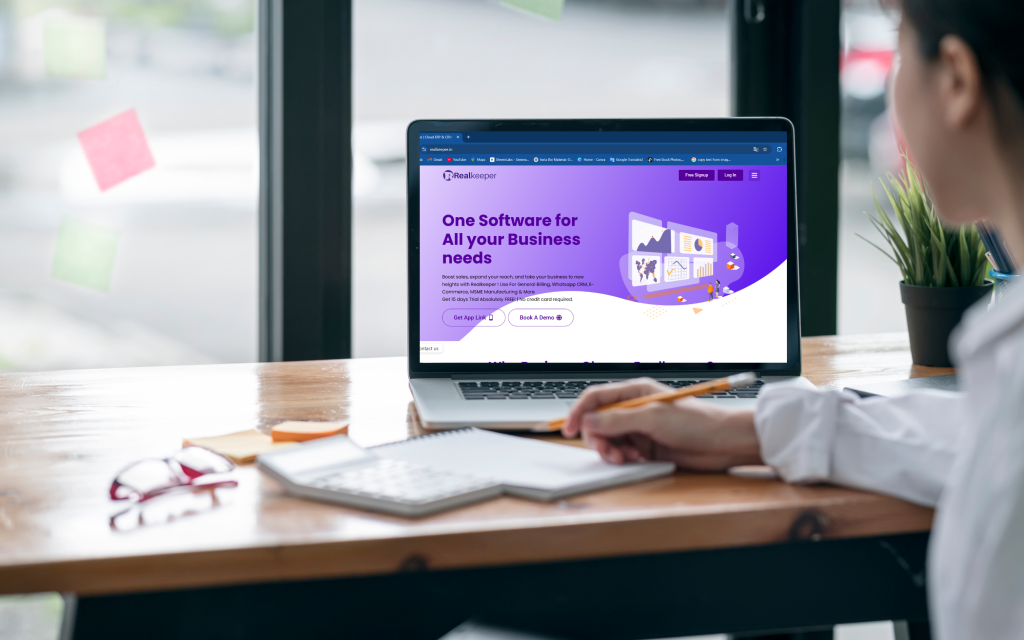For years, spreadsheets have been the lifeline of small and medium-sized businesses. They offered an easy way to record numbers, track sales, and calculate profits. But as businesses grew more complex, the cracks in spreadsheets started to show—errors multiplied, compliance became harder, and collaboration turned messy. In today’s fast-moving digital world, spreadsheets alone are no longer enough to manage business finances effectively.
That’s where Cloud Accounting Software comes in. Unlike traditional spreadsheets, cloud-based solutions are designed for speed, accuracy, and growth. They don’t just record numbers—they empower businesses with real-time insights, automation, and security. The shift from spreadsheets to cloud accounting is more than just a trend; it’s a transformation shaping the future of financial management.

The Shortcomings of Spreadsheets
While spreadsheets still have their place, relying on them as the backbone of financial management comes with serious limitations:
- Error-prone: A single wrong formula or misplaced digit can distort financial records.
- Time-intensive: Creating invoices, managing expenses, and reconciling accounts requires hours of manual work.
- Poor compliance: Tax rules like GST demand accuracy and timely filing, which spreadsheets cannot handle efficiently.
- Scalability issues: As a business grows, juggling multiple files and versions becomes chaotic.
- Security risks: Spreadsheets stored on local systems are vulnerable to data loss and breaches.
In short, spreadsheets are like patchwork—they work for simple tasks but fail when it comes to comprehensive, long-term financial control.
Why Cloud Accounting Software Is the Smarter Choice
Cloud Accounting Software is built for the challenges of modern businesses. It moves financial management from static, manual entries to a dynamic, automated system accessible anytime, anywhere. Here’s why it’s transforming the way businesses operate:
- Automation that Saves Time
Everyday tasks like invoice creation, expense tracking, and bank reconciliation are automated. Businesses save hours every week, freeing teams to focus on growth strategies instead of routine paperwork. - Real-Time Visibility
Unlike spreadsheets that need manual updates, Cloud Accounting Software provides real-time dashboards. Business owners can instantly see cash flow, pending payments, and profit margins without waiting for end-of-month reports. - Effortless GST and Tax Compliance
Tax compliance is one of the most stressful aspects of business finance. Cloud solutions automatically calculate GST, generate compliant invoices, and prepare tax reports, ensuring accuracy and timely filing. - Scalability for Growth
As your business expands, the software grows with you. Whether it’s adding new branches, users, or integrating other tools, Cloud Accounting Software adapts seamlessly. - Enhanced Data Security
Financial data is sensitive, and spreadsheets don’t offer much protection. Cloud-based solutions provide encryption, regular backups, and secure access controls, ensuring that business data is always safe. - Seamless Integrations
From payment gateways to CRM platforms, Cloud Accounting Software integrates with other business tools, creating a single ecosystem for financial management.
The Impact on Business Performance
The switch from spreadsheets to Cloud Accounting Software is not just about convenience—it has a direct impact on business performance:
- Reduced errors: Automated processes minimize costly mistakes.
- Faster decision-making: Real-time reports give leaders the clarity to act quickly.
- Cost efficiency: By cutting down manual work and errors, businesses save money in the long run.
- Professional image: Clean, branded invoices and organized financial reports improve credibility with clients and investors.
- Team collaboration: Cloud systems allow multiple users to work together without version conflicts.
This shift ultimately turns financial management into a strategic advantage rather than just a back-office task.
Why the Future Belongs to Cloud Accounting Software
Business landscapes are changing rapidly. Remote work, digital-first customers, and stricter compliance requirements demand smarter financial solutions. Here’s why the future belongs to Cloud Accounting Software:
- Work from anywhere: Teams can access data securely from any location, ensuring business continuity.
- Adaptability to regulations: As tax and compliance rules evolve, cloud systems update instantly to keep businesses compliant.
- Data-driven growth: Businesses need insights, not just records. Cloud platforms turn financial data into actionable intelligence.
- Eco-friendly operations: By reducing paperwork and manual processes, businesses move closer to sustainable practices.
Companies that rely on outdated systems risk falling behind. Those that embrace cloud solutions position themselves for resilience, agility, and long-term success.
Making the Transition Smooth
Switching from spreadsheets to Cloud Accounting Software may seem like a big step, but it can be made simple with the right approach:
- Identify pain points: Pinpoint where spreadsheets are slowing down processes.
- Choose the right software: Look for a solution that fits your business size, compliance needs, and industry.
- Train your team: Ensure employees are comfortable using the new system.
- Migrate data carefully: Shift financial records in a structured way to avoid disruptions.
- Start using automation: Leverage invoice automation, tax calculations, and reporting features from day one.
By following these steps, businesses can transition smoothly while immediately reaping the benefits.
Real-World Example: Small Businesses Growing Smarter
Take a growing retail business as an example. Initially, it managed finances with spreadsheets—tracking sales, expenses, and supplier payments manually. But as sales grew, errors in data entry and delays in GST filing started causing compliance headaches.
After moving to Cloud Accounting Software, the business automated its billing, gained real-time insights into cash flow, and drastically cut down errors. Compliance became stress-free, and the owners could focus on scaling their operations rather than firefighting financial mistakes.
This kind of transformation is happening across industries, proving that cloud-based accounting is not just a tool but a growth enabler.
Conclusion
The era of spreadsheets as the primary tool for managing business finances is ending. While they once served their purpose, today’s business world demands more—more accuracy, more speed, more security, and more intelligence. Cloud Accounting Software delivers all of this and more.
It automates routine tasks, ensures tax compliance, scales with business growth, and provides real-time insights that spreadsheets can never match. The shift to cloud solutions is not just about replacing old tools—it’s about future-proofing your business.
If your business still relies on spreadsheets, now is the time to step beyond them. Embrace Cloud Accounting Software and unlock smarter, faster, and more secure financial management. The future of your business depends on it.



